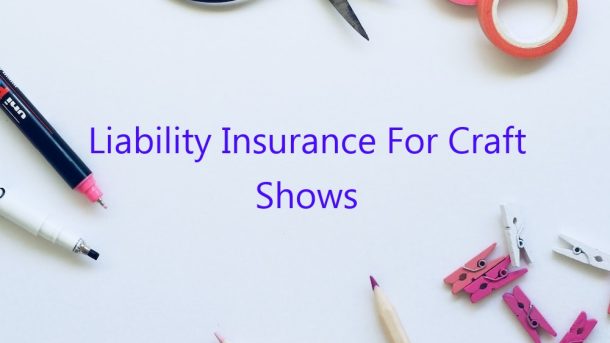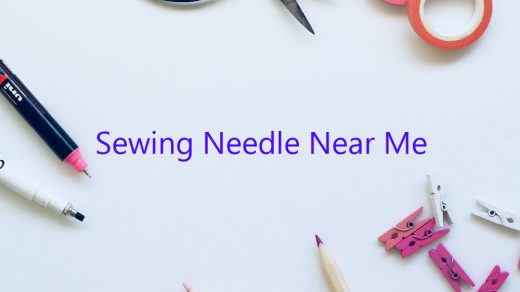If you’re planning to sell your crafts at a craft show, then you’ll need to have liability insurance. This type of insurance protects you in the event that a customer is injured while at your booth.
There are a few things to keep in mind when purchasing liability insurance for a craft show. First, be sure to read the terms and conditions of the policy carefully. There may be exclusions or limitations that apply to your business.
Also, be sure to have a copy of the policy with you at the show. If a customer is injured, you’ll need to be able to provide proof of insurance.
Finally, be sure to renew your policy before the show. Most policies expire after a certain amount of time, so you’ll need to make sure you’re covered for the duration of the show.
Liability insurance for craft shows can provide peace of mind in the event of an accident. It’s important to be aware of the exclusions and limitations of any policy you purchase, and to be sure to renew your policy before the show.
Contents [hide]
What type of insurance do crafters need?
There are many types of insurance a crafter can purchase, and the type of insurance needed depends on the type of crafting business.
The most common type of insurance for crafters is business insurance. This insurance protects the business from losses due to accidents, injuries, property damage, and more. Crafters should also consider liability insurance, which protects the business from lawsuits.
Another type of insurance crafters may need is product liability insurance. This insurance protects the business from losses if a product causes harm to a customer. For example, if a crafter sells a toy that later causes a child to choke, the business would be protected from any legal action taken by the child’s parents.
Crafting can be a risky business, so it is important for crafters to protect themselves and their businesses with the right insurance.
What kind of insurance does an artist need?
As an artist, you likely face different risks than those in other professions. For this reason, you may need different types of insurance.
In general, you may want to consider insurance that will protect you from:
-Injury or illness
-Loss of income or commissions
-Damage to your equipment or property
There are a number of different types of insurance that may meet your needs. Here are some of the most common:
-Health insurance: This will help protect you from medical expenses in the event that you become ill or injured.
-Property insurance: This will help protect your equipment and property in the event of damage or theft.
-Business insurance: This type of insurance can help protect you if your business is sued or experiences other losses.
-Liability insurance: This type of insurance can help protect you if someone is injured or their property is damaged as a result of your work.
It is important to speak with an insurance agent to find out which types of insurance are right for you.
Do freelance artists need insurance?
As a freelance artist, you may not think you need insurance. But the truth is, you may be putting yourself and your business at risk if you don’t have insurance. Here’s a look at why freelance artists need insurance and what types of coverage are available.
The biggest reason why freelance artists need insurance is to protect themselves financially. If you’re injured or your equipment is damaged, insurance can help you pay for the costs of replacing or repairing your equipment or covering medical expenses.
In addition to protecting yourself financially, insurance can also help you protect your business. If you’re sued because of a mistake you made or someone gets injured at one of your events, insurance can help cover the costs of any legal fees or damages you may be liable for.
There are a variety of insurance options available for freelance artists, including general liability insurance, product liability insurance, and event insurance. General liability insurance provides coverage for accidents and injuries that occur as a result of your freelance work. Product liability insurance covers any damages that may be caused by the products you sell or the services you provide. Event insurance can help protect you if something goes wrong at an event you’re hosting or participating in.
It’s important to note that not all insurance policies are created equal. Make sure you read the fine print and understand what is and isn’t covered before purchasing a policy.
Insurance is an important tool for freelance artists and it’s something you should consider adding to your business arsenal. By protecting yourself and your business with insurance, you can rest easy knowing that you’re covered in the event of an accident or lawsuit.
What is a product liability insurance?
A product liability insurance policy is a type of insurance that provides coverage for companies that manufacture, distribute, or sell products. This type of policy can help protect companies from lawsuits that may arise as a result of product-related injuries or damages.
There are several types of product liability insurance policies, and each one provides different levels of coverage. Some policies may offer protection against lawsuits that are filed as a result of product defects, while others may offer coverage for injuries or damages that occur as a result of using the product.
It is important to note that not all companies are required to carry product liability insurance. However, companies that do choose to carry this type of insurance policy may find that it offers a great deal of protection in the event that a product-related lawsuit is filed.
Do I need insurance to sell handmade goods?
There is no definitive answer to this question as it depends on the specific situation. Some people may be able to sell their handmade goods without insurance, while others may need to purchase a policy in order to be protected.
When it comes to insurance for handmade goods, there are a few things to consider. The first is whether or not the goods are made to order or if they are pre-made. If the goods are made to order, then the seller likely needs to purchase insurance in case the customer is not happy with the product or it is damaged during shipping. If the goods are pre-made, then the seller may not need insurance if they are not selling them online.
Another thing to consider is whether or not the seller is using their own name or a business name. If the seller is using their own name, then they likely do not need insurance as they are personally responsible for any damages or problems that may occur. If the seller is using a business name, then they may need to purchase insurance to protect their business.
Overall, it is important to speak to an insurance agent to determine if insurance is necessary for selling handmade goods. The agent can help assess the specific situation and find the right policy for the seller.
Do you need insurance to sell resin products?
When it comes to resin products, there are a few things you need to know in order to be successful in selling them. One of the most important things is whether or not you need insurance to sell them.
In general, you do not need insurance to sell resin products. However, there are a few exceptions. If you are selling products that contain flammable material, you may need insurance to cover any potential damages. Additionally, if you are selling products that could cause harm to someone, you may need insurance to protect yourself from any legal issues.
Overall, though, most resin products do not require insurance. This makes it a great option for those looking to start a business in this industry. With the right planning and marketing, you can be successful in selling resin products to your customers.
How much does Artist insurance cost?
How much does Artist insurance cost? This is a question many artists ask, but there is no easy answer. The cost of artist insurance depends on a variety of factors, including the type of coverage you need, the size of your operation, and the risks you face.
There are a few basic types of artist insurance: property insurance, liability insurance, and workers’ compensation insurance. Property insurance protects your equipment and other property from damage or theft. Liability insurance covers you in the event that someone is injured or their property is damaged as a result of your work. Workers’ compensation insurance covers medical expenses and lost wages for employees who are injured or become ill as a result of their work.
The cost of artist insurance will vary depending on the type of coverage you need. Property insurance is typically less expensive than liability or workers’ compensation insurance, but it may not provide as much protection. Liability and workers’ compensation insurance are more expensive, but they offer greater coverage.
The size of your operation also affects the cost of artist insurance. The more people you have working for you, the higher your insurance premiums will be. And the more valuable your property or equipment is, the more you will have to pay for insurance.
The risks you face also play a role in the cost of artist insurance. If you work in a dangerous industry, or if you have a history of insurance claims, your premiums will be higher.
Ultimately, the cost of artist insurance depends on a variety of factors. To get an accurate estimate, it’s best to speak with an insurance agent. They will be able to assess your needs and recommend the right coverage for you.




